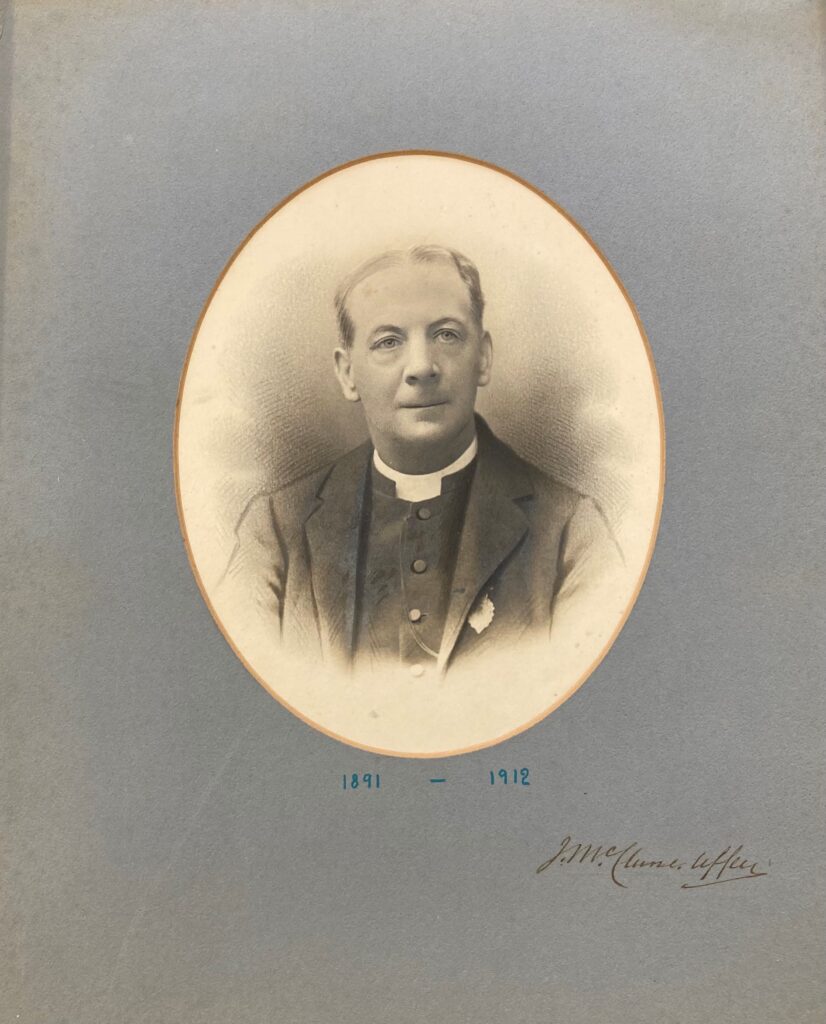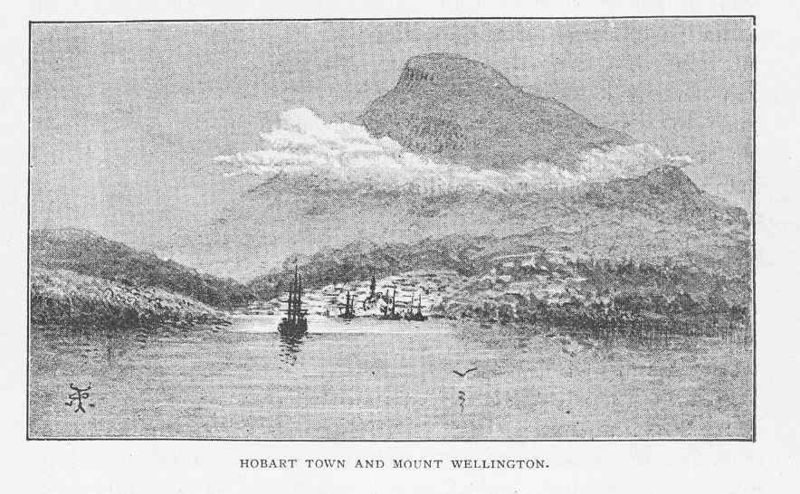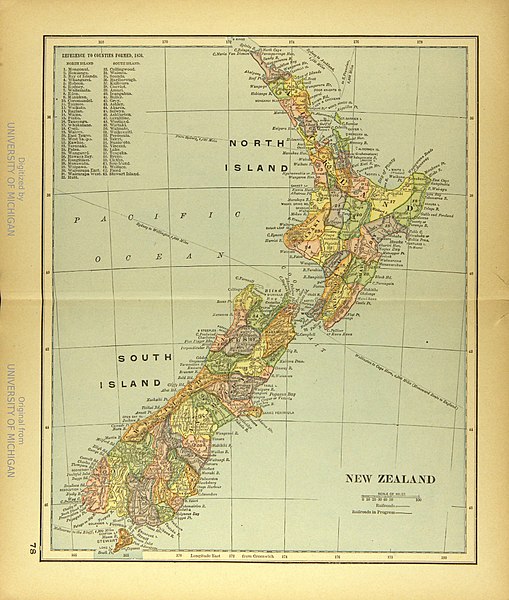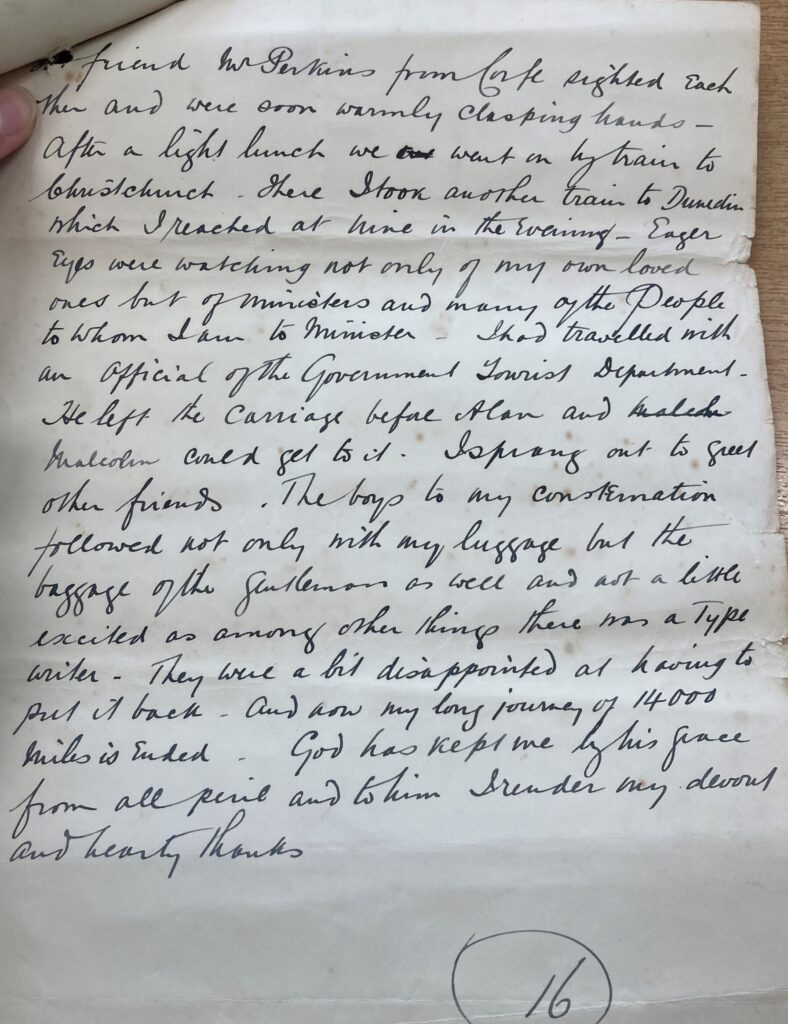This the fourth and final instalment of our blog series about the non-conformist Reverend James McClune Uffen and the journal he kept of his journey from Dorchester to New Zealand in 1911. If you have missed the tale so far, you can read part one, part two and part three to learn the full story of Uffen’s voyage…

—
Our last blog ended with the Captain of the Ruahine worrying for the safety of the ship due to stormy weather, however, on Thursday 20th July, Reverend James McClune Uffen and his fellow passengers reached Hobart (the Capital of Australia’s state of Tasmania). It was raining when they arrived, making the passengers miserable, but keen to land.
James received a letter by the pilot boat, from the Secretary of the Congregational Union of Tasmania asking for him to remain onboard. The Secretary came with his daughter to collect James from the Ruahine, taking him to their house and showing him ‘generous hospitality’.
While in Hobert, James also took the opportunity to visit a Mrs Soundy, a former member of the Dorchester Church. They spoke about various Dorchester friends.
Upon returning to the boat, James found in the cabin next to his
‘a young man suffering from delirium tremrens, I insisted upon his removal, much to the relief of other passengers whose cabins were in the same corridor.’
When the passengers awoke the next morning, the rain had cleared and they were able to see the city in all its beauty, with Mount Wellington covered in snow towering behind. Reverend Uffen’s friend from the day before arranged for him to visit various points of interest. It must have made quite an impact as James remarks that
‘I never saw a more picturesque city in my life’
On Saturday 22nd July, the Ruahine left Hobart and set sail for its final destination in New Zealand.
As they sailed the weather continued to be very bad and the sea rough. James recorded how on Monday 24th July a ‘hurricane’ hit in the morning and one huge wave struck right over the ship. He was in the lounge at the time and was flung from his seat. Luckily, he was able to catch the arms of two fixed chairs or he worried he may have been
‘dashed against a fixed table and perhaps have more or less damaged myself’.
Another passenger was not as lucky and was flung against a post due to the rough sea and badly hurt her face, requiring 9 stiches.
James began to worry that as the weather continued to be very bad, they ‘will probably be 2 days late’.
Finally arriving in New Zealand
On the morning of Wednesday 26th July, the passengers sighted the coast of New Zealand and the snow-capped mountains.

James expresses his melancholic feelings at seeing New Zealand for the first time in this journal entry,
‘There was much excitement [as] men and women looked at the shores of their new home, I stood apart, still and quiet I saw the new land dimly through my tears and said nothing. There was a sob in my throat I thought of the dear old land I had left and the dear faces upon which I may not look again.’
Curiously, at this point, there is a change in the diary itself. Whereas all the other pages in this journal had been typed, the last two pages are instead handwritten.
On July 27th at 12 o’clock, the Ruahine finally arrived at Wellington, the Capital of New Zealand. The sudden stopping of the engines woke up the passengers and they turned out of their bunks to look through the port holes of the ship at the lights of the sleeping city.
Before the passengers were allowed off of the ship, they had to be inspected by a doctor. When James’ turn came,
‘the Doctor simply saluted as I passed on’
When the ship drew into the wharf, there were two ministers waiting to great James. They took him to the house of a third minister who was unwell, however James records how he and his wife ‘gave me hearty welcome and substantial fare’.

At nine o’clock, James left Wellington for Port Lyttelton, a town near Christchurch on the south east coast of the South Island. He travelled in another vessel which was well fitted up and he had a ‘splendid’ first class cabin to himself.
The next morning, after eating breakfast, the ship arrived at the Port. James was welcomed by a friend called Mr Perkins from Corfe, and when they met, they warmly clasped hands. The journey was not yet over though, and after lunch, they went by train to Christchurch before another train to Dunedin, which James reached at nine in the evening.

Reverend James McClune Uffen finishes his journal of nearly two months with this final line,
‘And now my long journey of 14000 miles is ended. God has kept me by his grace from all peril and to him I render my devout and hearty thanks’.
—
We do not know much about James’ time in New Zealand, but by using the family history site Ancestry, we did find that he was recorded as being an Officiating Minister for the Congregational Independents Church in the New Zealand Gazette in 1912.
It also seems that he eventually returned to England, and was perhaps reunited with the friends and family he was so worried he would never see again. He is recorded in the England and Wales National Probate Calendar as passing away on the 30th June 1923 in Cornwall at the age of 78.

